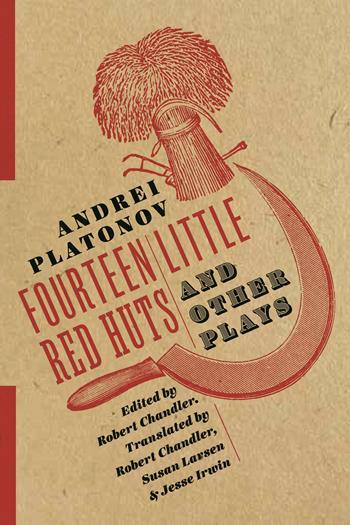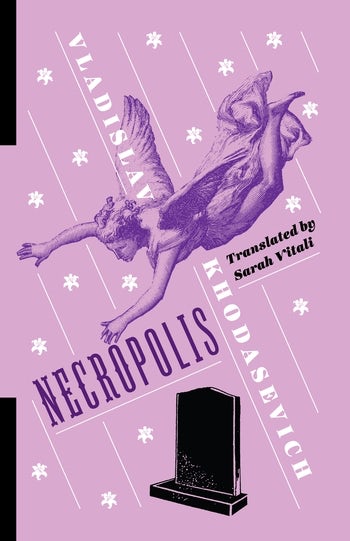Thursday Fiction Corner: Propaganda, the Absurd, and the Truth of Stalinist USSR in Andrei Platonov’s Plays
Welcome to Thursday Fiction Corner! This week Ani Kodzhabasheva, a PhD Candidate in Art History at Columbia University, considers Andrei Platonov’s portrayal of the USSR in relation to her experiences growing up in the former Eastern Bloc.
In post-Communist Bulgaria, where I grew up, I often encountered traces of the fallen regime’s language: houses marked “Exemplary Home” with a special blue plaque; stacks of old newspapers reporting that agricultural brigades had overfulfilled their quotas; an inscription on a Soviet Army monument claiming that our republic needs friendship with the USSR just as every living being needs air and sunlight.
The most ridiculous slogans, once posted on factory walls, are now circulated in blog posts:
Communism is inevitable.
Every jar of compote: a fist in the face of imperialism!
Or this literary gem: Public Bath Workers’ Brigade “N. V. Gogol”
And so on. I still can’t help but laugh out loud. It is cheap entertainment, and a bit of therapeutic release from the generational trauma.
Humor creates distance from that which we dread. I laugh at the slogans, and part of me cringes in horror: someone, a reasoning human being, wrote this. People had to believe it, or live their lives as if they did.
I have avoided thinking too much about the experience of having your language corrupted by state ideology – that is, until I read some of Andrei Platonov’s plays. A witness to the famines and Stalinist purges of the early 1930s, Platonov writes about his reality with an honesty that strikes a blow. He uses his characters’ muddled language in order to tell the truth.
Platonov not only pokes fun at state-mandated praise and hyperbole, but also shows the effects that this discourse has on people who are facing unspeakable tragedy. In Fourteen Little Red Huts, workers on a struggling collective farm are trying to live their lives according to socialist principles and to preserve their humanity – even as official directives, combined with despair, lead them to doubt and denounce each other.
The play’s tone easily flips from rambunctious humor to the absurd, and to raw expressions of vulnerability and pain. The workers ponder the meaninglessness of their struggle, and yet are overcome with a tragic need for faith and hope. A character calls himself a “class enemy,” only to profess allegiance to the revolution the very next minute, stating that “Each day of our labor lays the foundation for centuries to come – and on our kolkhoz revolution rests the fate of a hundred millennia.” At the sight of a distant airplane, someone exclaims: “It’s technology, my whole heart thunders! I feel like shouting, ‘Forward!’” This cry, completely at odds with the starving workers’ situation, reduces official reports of progress to bitter mockery. The farmers continue on with their labor in the face of futility, and their incongruous speech explains their predicament. “The wind rocks me as if I were empty. I want to believe in God!” someone says, quietly.
What Platonov does with language surely places him among the best writers of the twentieth century, as Joseph Brodsky has said. His plays at times resemble the absurdist antics of his contemporaries, the Dadaists, but Platonov’s breathtaking mastery of language is never indulged for its own sake. His goal is not to deconstruct all hope for beauty or meaning; it is to dissect reality and to show what propaganda, combined with state violence, does to human beings. The emotional power of Platonov’s writing cuts deep. Yet, improbably, his sense of humor makes it ring even more true. Don’t we sometimes laugh at ourselves in our moments of deepest confusion and loss?
Platonov is outrageously funny, especially when he lambastes his colleagues, the Soviet writers parroting official directives: “I am the prosaic Russian writer Pyotr Polikarpovich Latrinov. I presume that you know my books: Poor Tree, A Year of Profit, A Most Specific Figure, Eternally Soviet,” one of them introduces himself. At times, the tormented kolkhoz workers’ speech sounds just like the ridiculous slogans from my youth: “You know where we put people who’re insignificant? Here we have only the polysignificant!” But elsewhere, the pervasiveness of state ideology can make it hard to tell absurdity from tragedy. When a character says “There is a psy… psyche, stuck in my throat,” I don’t know whether to laugh, or cry out at his crippling pain.
Amid the feverish daze of the workers, swaying between elation and despair, a deeper existential angst comes through. One worker who lost her child says, “I’ve fulfilled my quota, but I haven’t had time to overfulfill it. My hands ache from grief, I can’t even weep anymore, I can only stare like a dead fish.” Bos, a European academic visiting the kolkhoz to study the concrete workings of socialism, states his impressions of the overall situation: “The wind appears to sorrow, and infinity is full of space, like a stupid hole, and the sea gets agitated too and weeps against the shore of the earth. As if all this were truly serious, pitiful, and splendid! But it’s only raging piffle!” The beauty of Platonov’s writing, so exquisitely rendered in English in this translation, can make you feel like the collective pain of the twentieth century’s tragic history is gripping you by the throat.
The majority of Platonov’s writings were not published during his lifetime, and his plays were not necessarily intended to be performed. Even his poetic stage directions – “A gray, boring dawn” – seem intended for readers rather than actors. Yet the power of Platonov’s words may be experienced most directly in the theater. Those of us in New York currently have the opportunity to see a rare staging of Fourteen Little Red Huts, performed by the Medicine Show Theatre Ensemble through November 18. Several shows will include post-performance conversations with experts from the fields of Russian studies and literature. Tickets are available here.
***
Before I leave you pondering the dangers of propaganda, let me share my favorite slogan from socialist Bulgaria, which allegedly hung on the wall of a poultry farm:
Each egg – a bomb, and each hen – a flying fortress against the aggressors!
In the spirit of that age, let me summarize my views on Andrei Platonov thusly:
Every Platonov reader – a nail in the coffin of the polarizing fake propaganda!
You can read an excerpt from the book Fourteen Little Red Huts and Other Plays here.





